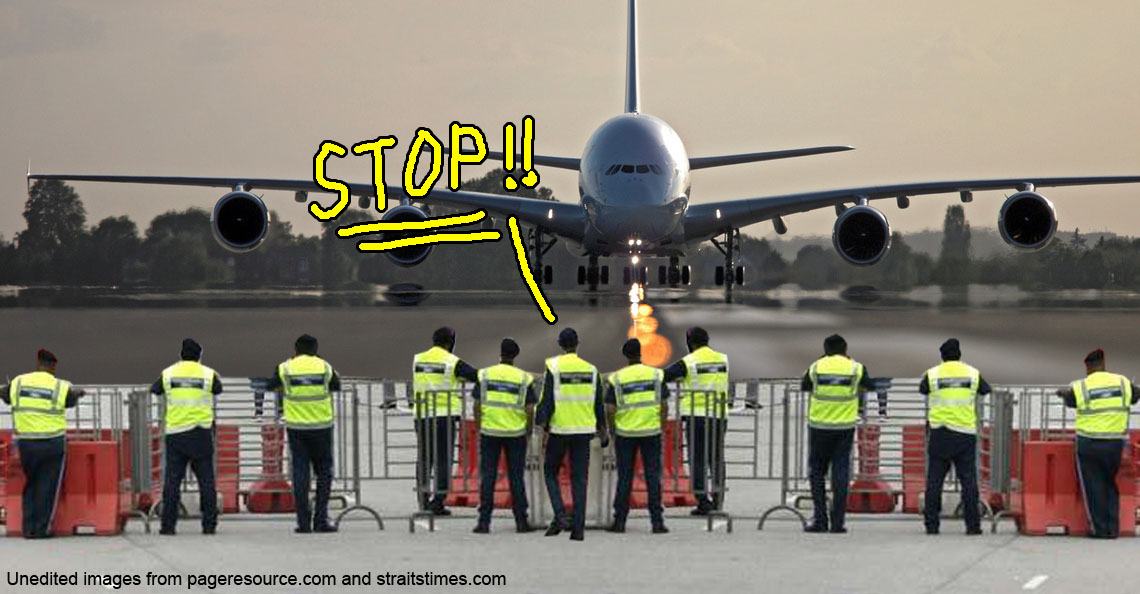How much does it cost if you kena coronavirus in KL? The answer might surprise you.
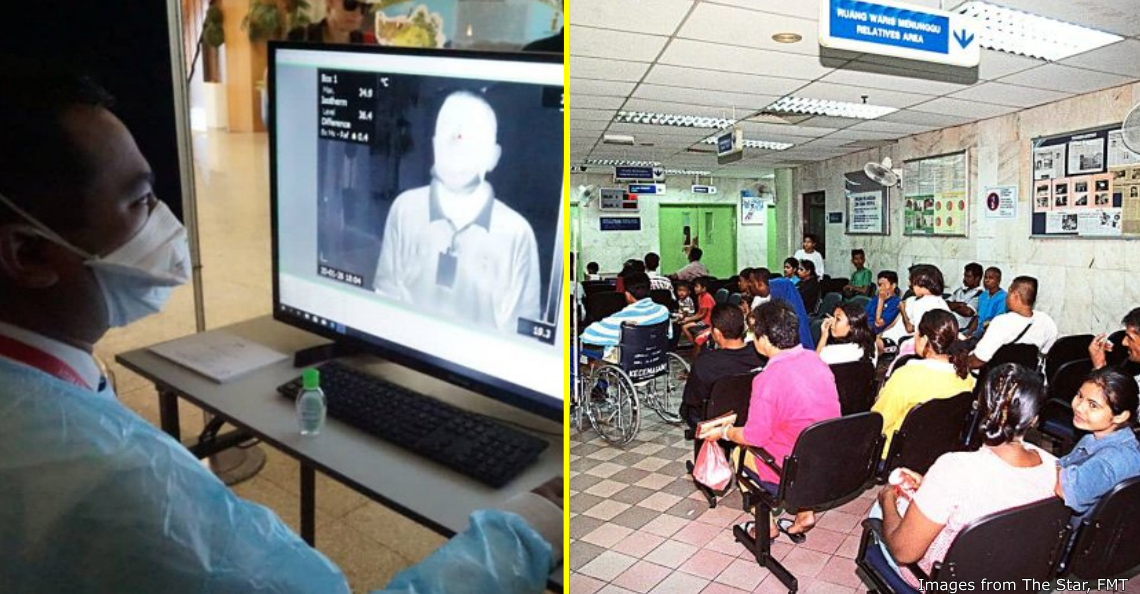
- 639Shares
- Facebook551
- Twitter7
- LinkedIn9
- Email12
- WhatsApp60
If we ask you what you would consider a contagious disease, your first thought last year would probably be dengue. But now, you’re probably thinking about the one thing that has gotten everyone wearing all kinds of masks in 2020: the coronavirus.
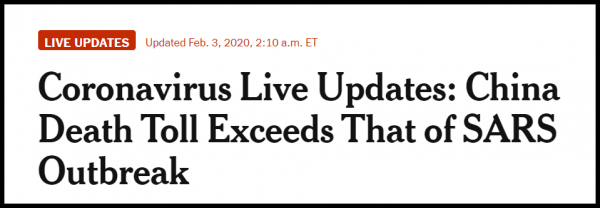
Just last month, Malaysia saw its first case of coronavirus when three Chinese nationals in Johor tested positive for coronavirus, and they were sent all the way to Hospital Sungai Buloh for further examination after being quarantined in Johor.
As the Wuhan coronavirus outbreak continues, it is now considered a viral infectious disease, with some even leveling it with SARS. Even the World Health Organization (WHO) has declared it an international health emergency. So if you do find yourself ridden down with coronavirus symptoms, you might want to visit a doctor to get it checked out.
Buuuuut don’t worry if you’re afraid of the potential costs, because…
Treatment for infectious diseases are free at public hospitals (。・o・。)
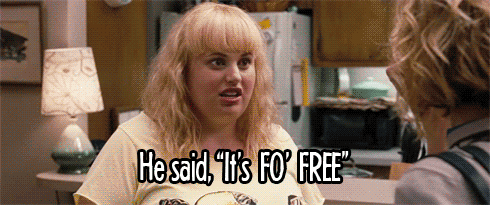
Yeah, you read that right.
Apparently, one can get their treatment fees waived if they go to a public hospital to treat infectious diseases. And by public hospitals, we mean government hospitals, like the Kuala Lumpur Hospital, University Malaya Medical Center, and Hospital Shah Alam. And infectious diseases could include:
To understand more, we’ve actually reached out to the president of Pertubuhan Doktor-doktor Islam Malaysia (PERDIM) Dr. Ahmad Shukri and president of Malaysian Medical Association (MMA) Dr. N Ganabaskaran. We’ve also gotten in touch with Deputy Minister of Health Dr. Lee Boon Chye for clarification.

It has been confirmed by all three doctors that all patients with infectious diseases can be treated free of charge.
“Public hospitals generally give free treatment. That’s why people go there.” – Dr. Ganabaskaran, in an interview with Cilisos
But, of course, there are terms and conditions applied. For example, it only applies to Malaysian citizens, and not foreigners. According to Dr. Lee, foreigners are only exempted from charges if they are treated for the following:
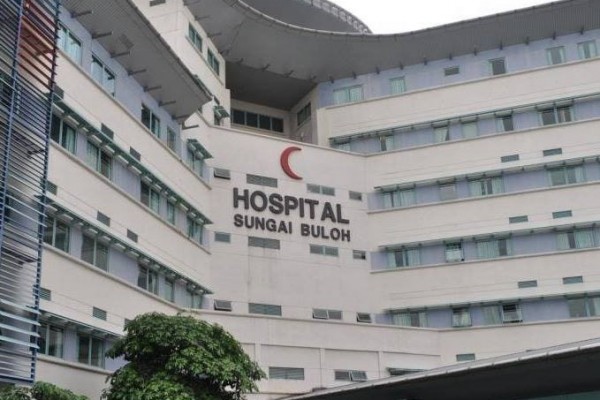
In addition, the waive of charges only apply to treatment of diseases – sometimes consultation is free as well, depending on the hospitals you go to. But the thing is even if public hospitals do charge you for consultation, it’ll only amount between the range of RM1 and RM5. Okay what, quite fair kan?
But if you, in any way, find the fees unfair, you are welcome to appeal to the Social Welfare Department.
“The role of the Social Welfare Department is to revise and give discounts according to the appeals that are unhappy with the charges lodged.” – Dr. Shukri, in an interview with Cilisos
According to Dr. Ganabaskaran, public hospitals are a little more cautious with people who have infectious diseases than the usual diseases, because they don’t want the diseases to spread. And, well, good for these public hospitals.
But then the knowledge that public hospitals waive charges for infectious diseases got us wondering…
Why do private hospitals charge so much for infectious diseases treatment?
So it seemed that while it’s free to get treatment for infectious diseases in public hospitals, it’s a different case with private hospitals. Apparently, private hospitals could charge patients with dengue, which is an infectious disease itself, between RM1,000 and RM3,000, excluding extra stuff like blood tests or scans. Meanwhile, a simple consultation could incur charges from RM30 to RM125.
Compared with the free treatment and RM1-RM5 consultation fees in public hospitals…

We can’t be certain about other infectious diseases, such as tuberculosis and HIV/AIDS, but we can only assume they could be more expensive or at least on the same level as the cost incurred for dengue.
Dr. Shukri told us that there is such a huge difference in the treatment price range for infectious diseases between private and public hospitals because these two are funded by different organizations respectively. While public hospitals are mostly funded by the Ministry of Health (MOH), private hospitals are funded by private companies, agencies, or GLCs.
“Public hospitals are subsidized by the government, and the amount of subsidy is 95 to 99%.” – Dr. Lee, in an interview with Cilisos
And the source of funding could have influenced the goals of these different institutions – public and private. Dr. Ganabaskaran claimed that public hospitals, due to being subsidized by the government, is for non-profit, while private hospitals are for profit – but that doesn’t mean private hospitals are not there to help.
“A sizable amount of funds at private healthcare facilities are used for regulatory compliance and also to enhance patient experience at the healthcare facility. The high overheads and enhanced experience are among the main reasons why private healthcare is priced higher.” – Dr. Ganabaskaran
According to Dr. Ganabaskaran, when a doctor in a private hospital has diagnosed a patient with an infectious disease, especially if it’s a serious illness, they have the right to refer them to a specialist in a public hospital. On the other hand, a public hospital is not allowed to turn away patients.
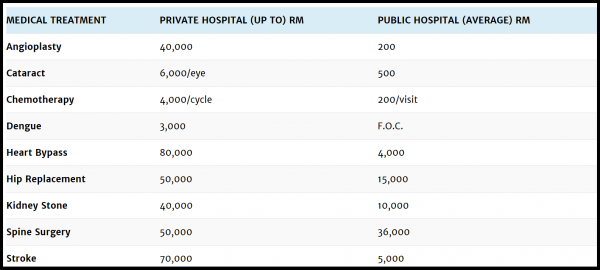
However, despite the exorbitant price range in private hospitals, they are actually considered to be under control. In 2006, the government enforced a Private Healthcare Facilities and Services Act 1998 to regulate all private hospitals across Malaysia, including prices.
On top of that, late last year, the MOH has announced that it will be introducing a mechanism to control medicine prices in private healthcare. But then, the ministry also announced that the government will no longer control consultation fees in private healthcare, allowing private hospitals to adjust their own consultation fees as they see fit.
“With the abolition of the consultation fee control, doctors and dentists in the private sector can fix their own consultation fee rate on their patients.
Patients also can evaluate and decide beforehand if the consultation fee offered is appropriate. The abolishment of the consultation fee is a move to empower the people in decision making. ” – Health Minister Dzulkefly Ahmad, as quoted by NST
Weird flex, but okay. Who knows? Maybe private hospitals will be a little kinder with their consultation fees now that the government is no longer controlling them…? (。•ˇ‸ˇ•。)
Okay, now that that’s out of the way…
Is coronavirus treatment free of charge too?
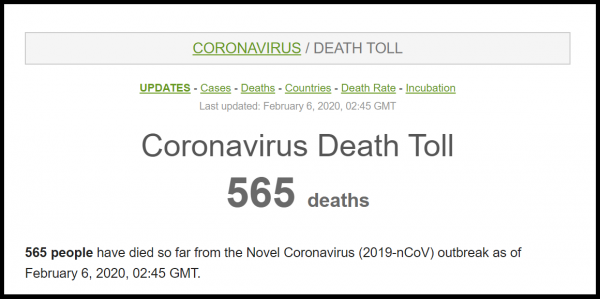
At this point, we don’t think we have to get too deep into what coronavirus is, except for the fact that it has, at time of writing, taken 565 lives – you can always get your update on the coronavirus death toll counter (yes, there is a death toll counter). And yes, coronavirus is an infectious disease.
“Coronavirus is an infectious and notifiable disease.” – Dr. Lee
A notifiable disease is “a disease that must be reported to public health authorities at the time it is diagnosed because it is potentially dangerous to human or animal health“. As such, the government will waive all charges for consultation and hospitalization of coronavirus patients, regardless of whether they’re locals or foreigners, according to Dr. Lee.
Basically, coronavirus consultation and hospitalization is free for all.
Okay, so why did we say “consultation and hospitalization”? Well, because technically, there is no treatment for coronavirus, as in there is no vaccine or medication available…yet.
“For coronavirus, there is no treatment at this particular moment.” – Dr. Shukri

Currently, health professionals are hard at work on a treatment plan for coronavirus symptoms. But because there’ s currently no treatment available, the three doctors that we have interviewed gave similar answers about what happens to coronavirus patients currently: the patient will be isolated and quarantined immediately after diagnosis of coronavirus. At latest count, there are now 12 confirmed cases in Malaysia.
“Patients will be hospitalized in special wards with medical care in accordance to advise based on experiences, especially in China. They will be kept until they are well and test negative for coronavirus before they are discharged, so that they won’t transmit the infection.” – Dr. Lee
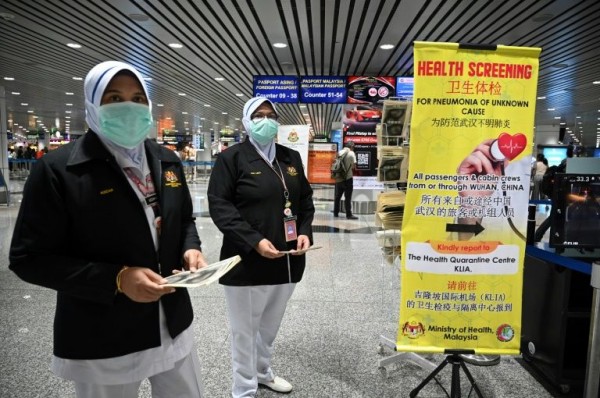
And recently, coronavirus has been found to be transmittable through human contact, first proven when an American man was found to be coronavirus positive after his wife had traveled to Wuhan earlier. So, the MOH has set up protocols for that too.
“When a healthy person has been in close contact with a coronavirus patient, they will be required to be confined to their home, avoid close contact with family members, barred from going to public places, and have their symptoms monitored daily. This will last for 14 days.” – Dr. Lee
According to Dr. Shukri, all they can do now is provide supportive healthcare to the infected.
“That means we try to maintain the vital signs, like stable blood pressure, pulse, and oxygen levels. If they have high fever, we try to reduce the fever. We do blood tests regularly and make sure the patient is stable.” – Dr. Shukri
Right, so we understand that you might be slightly scared now after learning that there is no cure for coronavirus at the moment, but…
Malaysia has undertaken all precautions necessary to contain the outbreak
The coronavirus outbreak is, undeniably, big and dangerous and kind of scared the pants off of everyone, but Malaysian healthcare is also considered to be one of the the best in the world.
“Here (in Malaysia), you don’t need to make an appointment to see a specialist and you don’t need a referral from a general practitioner. It’s as simple as registering at a hospital of your choice and waiting in line to see your specialist of choice.” – International Living, as quoted by FMT
Plus, it doesn’t cost you an arm and a leg and maybe even an organ to get treated in our public hospitals, unlike the healthcare sector in the US, so, you know, that’s nice too.
And Malaysia has also put a number of measures in place to handle coronavirus.

Here’s what the government has done so far:
- Stopped issuing visas for Chinese travelers from affected areas
- Organized an Emergency Response Team (ERT) at the Malaysian embassy in China
- Added thermal sensors at Malaysian main entry points, such as KLIA
- Set up Health Quarantine Center at KLIA
Not only that, apparently, it’s also proven that Malaysia has been pretty well-versed in dealing with virus outbreaks in the past, like the Nipah virus and SARS. It can be seen that Malaysia was pretty active in combating them, such as completely flattening the origin location of the Nipah virus outbreak and banning people from certain countries from entering Malaysia. Also, the Global Health Security (GHS) placed Malaysia in the 18th spot out of 195 countries last year in handling outbreaks! (・о・)
“Compared to SARS in 2002, when we took weeks to trace the infections, now we have managed to do so much earlier due to our experience, expertise and the technology employed.” – Infectious disease specialist Dr. Christopher KC Lee, as quoted by NST
There’s really not much else we can do now, apart from trusting the MOH to do their job. In the meantime, you can also do your part, like wash your hands, don’t sneeze on people, don’t spread fake news, and take good care of your own health.
- 639Shares
- Facebook551
- Twitter7
- LinkedIn9
- Email12
- WhatsApp60


